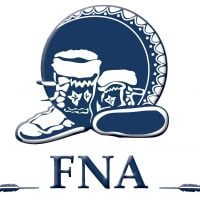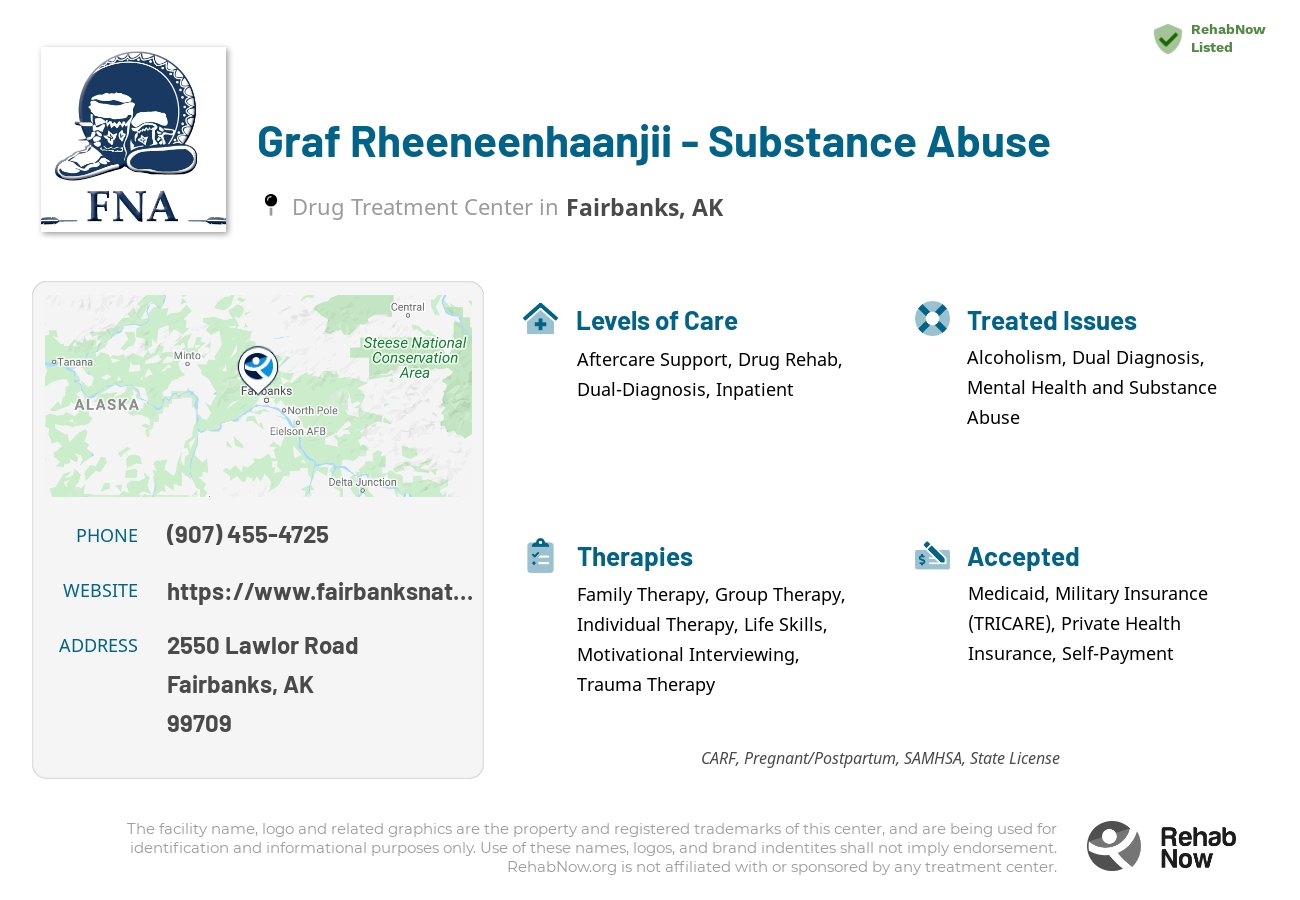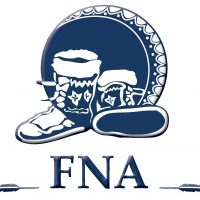Graf Rheeneenhaanjii - Substance Abuse
Drug Rehab Center in Fairbanks, Alaska
Graf Rheeneenhaanjii - Substance Abuse is an accredited and licensed addiction and substance abuse treatment facility in Fairbanks, Alaska that offers personalized treatment and support to individuals of all backgrounds and identities, including a variety of tailored services and resources for long-term sobriety and a healthier lifestyle.
About Graf Rheeneenhaanjii - Substance Abuse in Alaska
Located in Fairbanks, Alaska, Graf Rheeneenhaanjii - Substance Abuse is a renowned addiction treatment facility that has been providing comprehensive care since its establishment in 1967. The center specializes in treating individuals suffering from alcoholism, drug addiction, and dual diagnosis. Graf Rheeneenhaanjii offers a range of services catered to meet each client's unique needs, including aftercare support, drug rehab, dual-diagnosis treatment, and inpatient care. As a trusted and accredited provider, Graf Rheeneenhaanjii holds certifications from prestigious organizations such as CARF, SAMHSA, and maintains a valid state license. With a capacity of 12 beds, the center ensures that every resident receives personalized attention and care. Private health insurance is accepted at Graf Rheeneenhaanjii, making their services accessible to a wider range of individuals seeking treatment.
Graf Rheeneenhaanjii - Substance Abuse is committed to providing a comprehensive array of services to address addiction and substance abuse. Their treatment approach focuses on addressing the underlying causes of addiction and offering the necessary tools for recovery. Through their aftercare support program, individuals receive ongoing assistance and guidance to maintain sobriety after completing their initial treatment. The center offers drug rehab services, providing a safe and supportive environment for individuals to detoxify and overcome physical dependence on substances. The facility also specializes in dual-diagnosis treatment, recognizing the complex relationship between mental health disorders and addiction. Moreover, Graf Rheeneenhaanjii provides inpatient care, ensuring that clients receive round-the-clock support and supervision during their recovery journey. With a strong emphasis on individualized care and evidence-based practices, Graf Rheeneenhaanjii - Substance Abuse is dedicated to helping individuals achieve lasting recovery from addiction.
Genders
Ages
Modality
Additional
Accreditations
State License
SAMHSA

CARF
The Commission on Accreditation of Rehabilitation Facilities (CARF) is a non-profit organization that specifically accredits rehab organizations. Founded in 1966, CARF's, mission is to help service providers like rehab facilities maintain high standards of care.
Conditions and Issues Treated
Levels of Care Offered
This center offers a variety of custom treatment tailored to individual recovery. Currently available are Aftercare Support, Drug Rehab, Dual-Diagnosis, Inpatient, with additional therapies available as listed below.
Inpatient treatment for alcoholism or drug addiction is an option that provides the addict with a supportive environment in which they can stop using. This type of treatment is appropriate for addicts that are most in need of intensive care and supervision. This includes those who were unable to quit on their own, those who need more structure than they can get in outpatient treatment.
Aftercare support is vital to those who have completed a drug or alcohol treatment program. This support comes in individual and family counseling, treatment of psychiatric and other medical conditions, and medications to reduce cravings. It helps recovering addicts adjust to normal day-to-day activities and can last for a year or longer.
The majority of drug and alcohol addicts who receive aftercare treatment do not relapse. It is estimated that without aftercare, the relapse rate will be between 70 to 90 percent for most people. Aftercare is the final stage in addiction recovery, but it will also help maintain sobriety if relapse does occur.
Therapies & Programs
No single treatment works for all addicts; therefore, the goal of treatment and therapy should be to find what works best for each individual. Some people requiring addiction treatment may only need a few weeks of inpatient care. Others will require long-term residential care. Tolerance and withdrawal levels vary from person to person and thus affect the intensity of the treatment needed.
If an individualized approach to treatment and therapy is not offered, addicts may fail to reap benefits from their efforts. Professionals must customize plans according to their patient’s needs, limitations, and strengths. The goal of all forms of addiction treatment should be for addicts to find healthy ways to cope with their addiction and its underlying causes.
The therapies usually include siblings, children, and parents who are involved in their daily lives. These sessions are vital because they address past issues that may have hampered an addict’s or alcoholic’s recovery and provide support at a crucial time!
One of the most critical aspects of family therapy is helping addicts’ loved ones see their situation in a new light. It’s also one of the most challenging things a family can do when a loved one struggles with addiction or alcoholism.
Group therapy is held in a safe, controlled setting where patients can feel comfortable sharing their struggles and gaining perspective through shared conversations. It takes place in a group rather than one on one to prevent feelings of isolation or being unique in their situation while creating an environment for addicts at Graf Rheeneenhaanjii - Substance Abuse to develop fellowship, accountability, and support. Group therapy is an important tool in recovery that prevents cravings that prompt a return to active addiction.
This type of therapy involves the use of a variety of therapeutic techniques to help addicts recover from past traumas that might have triggered their substance abuse. During these sessions, therapists will work with the addict to address painful memories and learn how to cope effectively with stressors as they arise.
During these types of sessions, therapists will typically focus on three main goals:
- Identifying and expressing painful emotions associated with past traumas.
- Reducing the effects of stress on an addict’s life by developing more effective coping mechanisms.
- Developing healthy ways of thinking about stressful situations that can help addicts avoid substance abuse issues in the future.
This type of therapy is typically used in conjunction with other types of addiction treatment services. By identifying and dealing with the root cause of addiction, most addicts can overcome their cravings and prevent relapse once they leave rehab.
Many different types of addiction treatment services exist to help addicts safely get sober, but it’s important for recovering individuals to find a therapist or support group that will help them address the root cause of their addiction.
Cognitive-behavioral therapy is a talking-based method that helps people struggling with addiction replace destructive behaviors with healthier ones. CBT also helps them identify the underlying thoughts and beliefs that cause these behaviors in the first place and ways to control those thoughts and feelings. It can be administered as a holistic therapy or as part of combination therapy and—as opposed to turning to drugs and alcohol—helps addicts learn how to respond to negative thoughts instead.
Life skills training is beneficial for addicts in recovery because it helps them learn how to take care of themselves and improve their quality of life, which can promote feelings of purpose and motivation.
This type of treatment works by teaching individuals life-enhancing skills that support positive living, including:
- Healthy lifestyle habits
- Skills to effectively manage stress
- Effective communication skills to help them get their needs met without turning to drugs or alcohol
- Money management and budgeting skills so they can continue to take care of themselves after treatment ends.
Payment Options Accepted
For specific insurance or payment methods please contact us.
Is your insurance accepted?
Ask an expert, call (888) 674-0062
Additional Details
Specifics, location, and helpful extra information.
Fairbanks, Alaska 99709 Phone Number(907) 455-4725 Meta DetailsUpdated November 25, 2023
Staff Verified
Graf Rheeneenhaanjii - Substance Abuse Patient Reviews
There are no reviews yet. Be the first one to write one.
Fairbanks, Alaska Addiction Information
Alaska is enduring a multi-faceted drug and alcohol abuse problem. Heroin-related overdoses are 50% higher in Alaska than in the rest of the United States. Methamphetamine use is a major contributing factor to violent crime in Alaska. More than 60,000 Alaskans need some sort of treatment for substance abuse and/or addiction.
The drug addiction problem in Fairbanks, AK is relatively bad. In 2016, there were 153 drug overdose deaths in Fairbanks, Alaska. Alcohol is the most commonly abused substance with 37% of residents reporting drinking. 8% of Fairbanks residents reported using illicit drugs. If you or someone you love is struggling with addiction, there is help available. Treatment options include individual and group counseling, 12-step programs, medication-assisted treatment, and inpatient and outpatient programs.
Treatment in Nearby Cities
- Girdwood, AK (274.5 mi.)
- Palmer, AK (230.2 mi.)
- Delta Junction, AK (86.8 mi.)
- Haines, AK (559.5 mi.)
- Kodiak, AK (510.8 mi.)
Centers near Graf Rheeneenhaanjii - Substance Abuse
The facility name, logo and brand are the property and registered trademarks of Graf Rheeneenhaanjii - Substance Abuse, and are being used for identification and informational purposes only. Use of these names, logos and brands shall not imply endorsement. RehabNow.org is not affiliated with or sponsored by Graf Rheeneenhaanjii - Substance Abuse.







